The Thicket
Has guns, will travel.
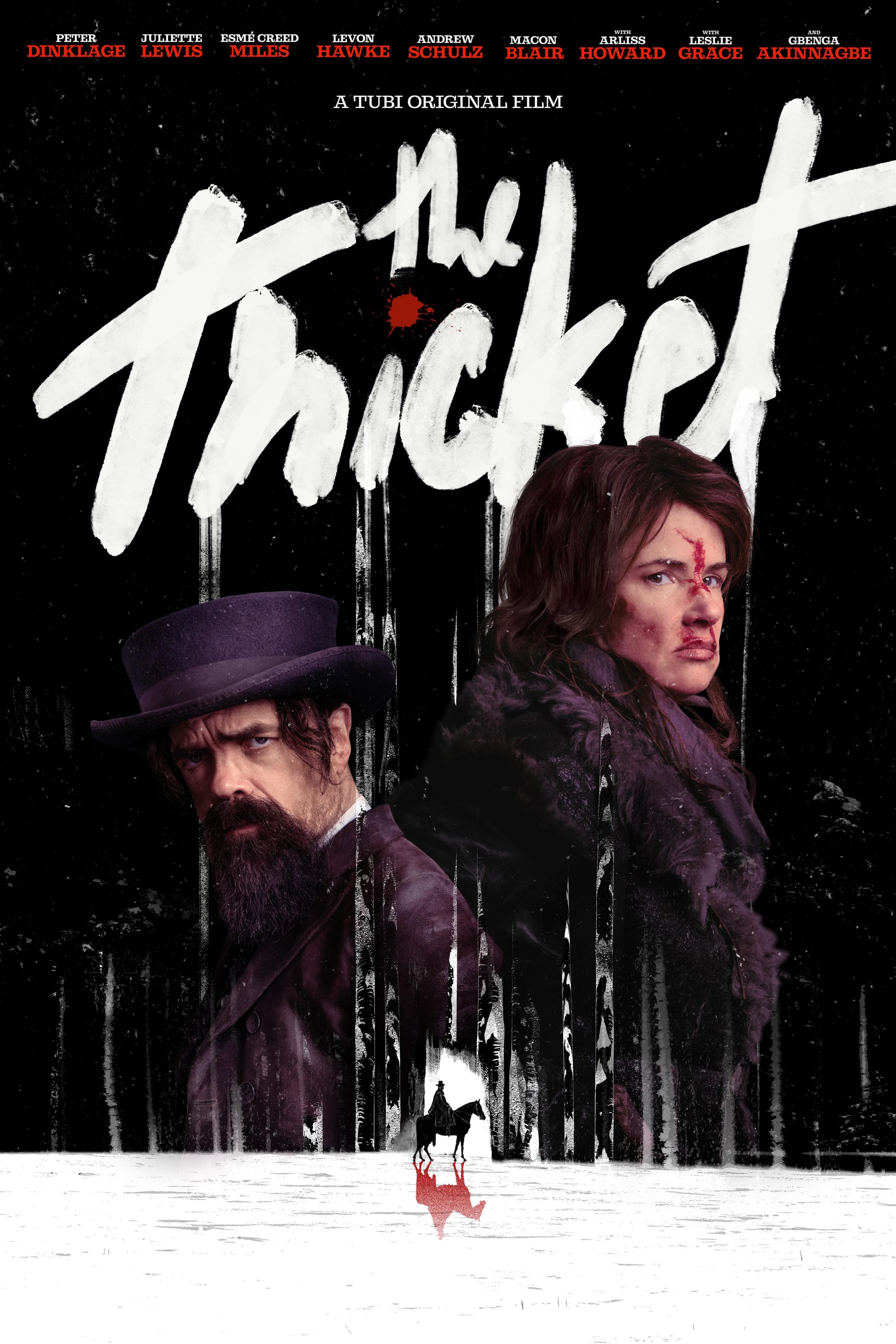
When a bounty hunter and a band of unlikely heroes pursue a brutal killer, they find themselves in a deadly no-man's-land known as the Thicket.

This film opens with a motorcycle, riding hell bent for leather across a snowy, desolate plain, ridden by a leather and furs swaddled rider in goggles… which made me think that I read the synopsis wrong at first, and the film was a post-apocalyptic cowboy kind of thing. But no, The Thicket is a straight-up regular cowboy movie, it's just one that’s set in a time where the horse was slowly being replaced with the horseless carriage.
After the opening scene, we never see another motorcycle, or even an automobile that I recall, which just makes the motorcycle's inclusion seem even more strange. It makes me wonder why the motorcycle was even included in the film in the first place. The film doesn't give me any kind of answer. In fact, the rider literally walks away from the bike moments after we first see it, literally abandoning it by the side of the road, and never returns to it, or mentions it, so...
I guess I just have sit with this question forever then.
I haven’t read the novel that this movie is based on. Maybe there was a reason for the motorcycle in there, a reason that was big enough for it to make the leap from page to screen. But the thing is, if there is a reason in the novel, I still can't imagine that it played all that important of a role in the story. It certainly wasn't integral to the plot we see in the film. Plus, if the motorcycle was important to the story, then not only would they have been forced to explain it at some point, or to at least give it at least some context, it also would've shown up again, right?
But it didn't, and no one ever spoke of it again, so there must not be any reason in the book that makes it important enough to include it in the film, so... why is it there then?
It bothers me.
Anyway, the novel has the same title as the film. It was written by Joe R. Lansdale, and released in 2014.
It begins...
“I didn’t suspect the day Grandfather came out and got me and my sister, Lula, and hauled us off toward the ferry, that I’d soon end up with worse things happening than had already come upon us, or that I’d take up with a gun-shooting dwarf, the son of a slave, and a big angry hog, let alone find true love and kill someone, but that’s exactly how it was.”
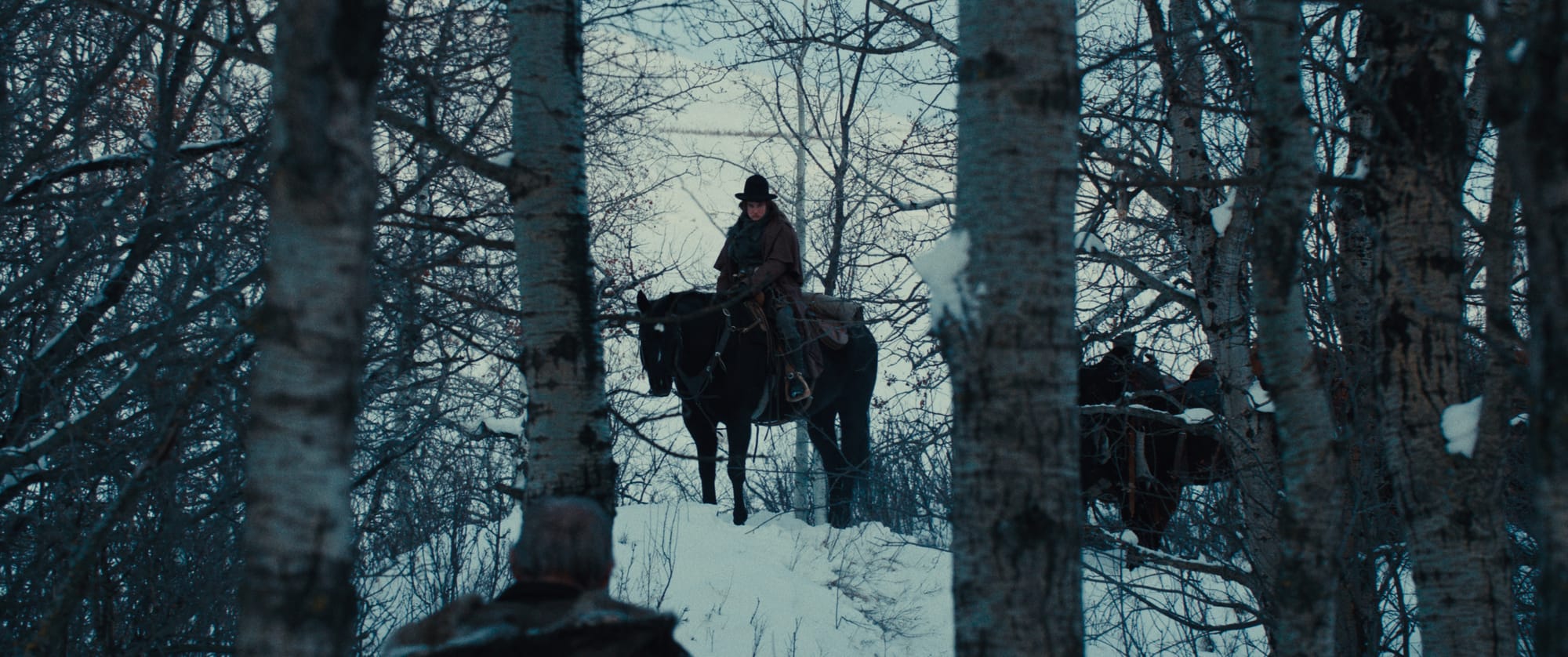
Well... that's certainly a sentence...
The title of both the film and the book refers to the Big Thicket, which is a heavily forested area of mixed pine and hardwood forests in Southeast Texas, recognized as a biosphere reserve by UNESCO. The book is described as a mystery/suspense novel, which… again, I haven't read it, and these categories are often nebulous and overlap heavily, but judging by the film, I don’t know if mystery/suspence is where I’d shelve it, personally. I mean, why not "Western" maybe?
But like I said, I haven’t read the book. Honestly, I don’t think I’ve read any of Lansdale’s stuff. Maybe one or two things. I’m familiar with the name, and the general tone of his work, so I bet that if I went and checked my shelf, I might find some of his work there.
Whatever. Doesn’t matter. I digress.
My point is, maybe the novel does make a bigger deal of the motorcycle than the film does. I don’t know. Either way, I do know this, despite me being fully aware that this moment in history did actually exists (mostly due to the film Big Jake), the motorcycle still feels like a huge anachronism.
It’s not, but it feels that way.
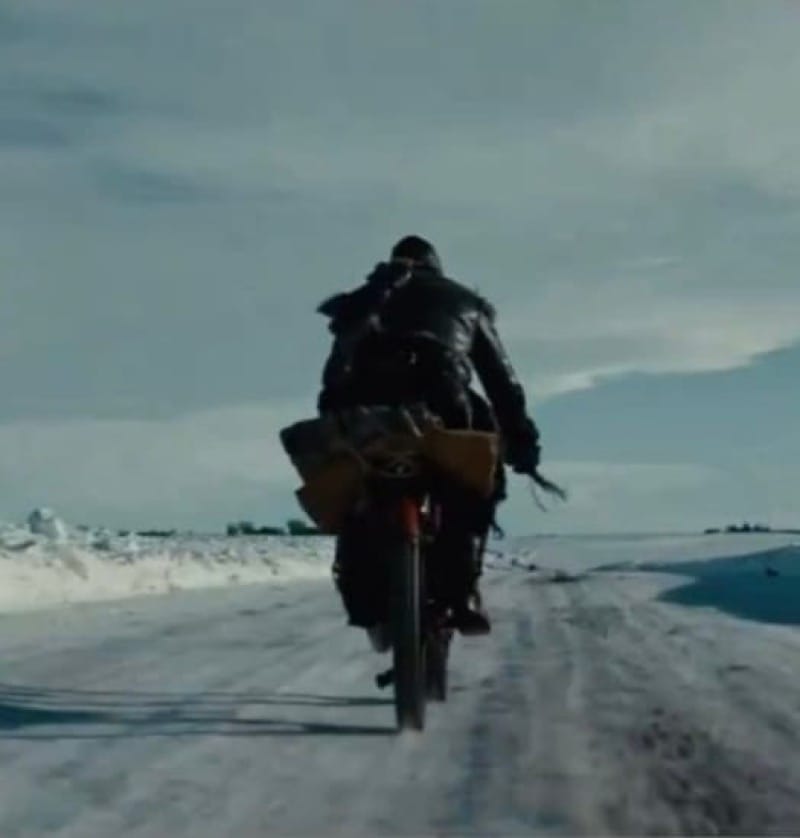
So...
After their parents are killed by a pox, a brother and sister named Jack and Lulu are picked up by their grandfather, who is taking them to their aunt in Kansas, but they are waylaid at a ferry by a gang of outlaws led by an infamous, rugged, raspy-voiced, and scarred woman named Cutthroat Bill.
Bill shoots their grandfather down, and kidnaps Lulu.
Injured and left for dead, Jack is desperate to find help to save his sister. That’s when he meets Reginald Jones, a sharpshooting little person, and Eustace, an ex-slave and Reginald’s business partner, They are a pair grave diggers for hire and part time bounty hunters, and Jack manages to hire them to help.
He does this by dangling the $10,000 bounty for Bill at first, and then by promising his grandfather’s huge swath of land. The trio set out into the frigid Texas winter. Along the way, Jack meets a prostitute named Jimmy Sue. He helps her escape from her abusive pimp, and now the trio of hunters are a foursome. Together, they pass through dangerous ramshackle towns, isolated trading posts, and the wild wildernesses, with only the bare hope that Lulu is still alive.
Lulu is still alive, of course. But only because Bill seems captivated by the young woman, and is dragging her to her winter hideout in The Thicket, a place where the hunters will have no hope of ever finding her. And once there, once Bill loses interest in Lulu, then the girl’s days are numbered.
They’re all on a collision course to a classic Wild West showdown.
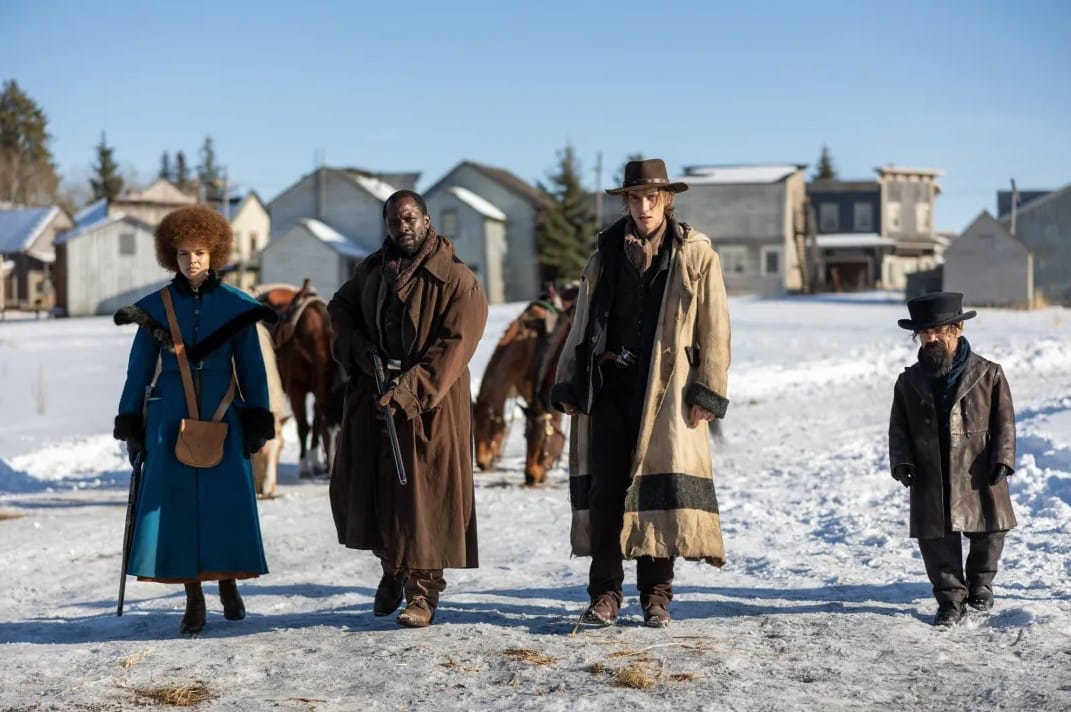
Long a passion project of Peter Dinklage, the Thicket is a dirty old western.
Both realistic and silly, it’s an end of an era set film that was made in the style of those end of the era Hollywood Westerns. While it’s clearly influenced by films like McCabe and Mrs. Miller, Jeremiah Johnson, The Good, the Bad, and the Ugly and all those Spaghetti Westerns, Butch Cassidy and the Sundance Kid, Pat Garrett and Billy the Kid, Little Big Man, The Wild Bunch, The Long Riders, on and on and on, even The Assassination of Jesse James by the Coward Robert Ford, but still... the story has much more in common with the more classic examples of the genre, like True Grit and The Searchers, even the previously mentioned Big Jake.
It’s not in the same league as any of those films, but still… it tries.
The thicket is a film with no interest in the romanticism of the American West, or the myth of Western Expansion. Instead it gives us a muddy, lawless, and hopeless depiction of the Western Frontier, a “realistic” version, showing us a place that is as cold and unforgiving as the winter winds cutting across the seemingly endless expanse of Texan flat lands. It’s a place made all the worse by the fact that it is also populated mostly by gunfighters, scumbags, and absolute psychopaths, all of them ready to kill or harm anyone who might be different from them in any way. So, it's basically just the outer suburbs and small towns of White America…
Anyway, this means that our little band of heroes, especially Jack and Lulu, get battered about quite a bit, by the landscape and by everyone they run across, but most of all, by Cutthroat Bill.
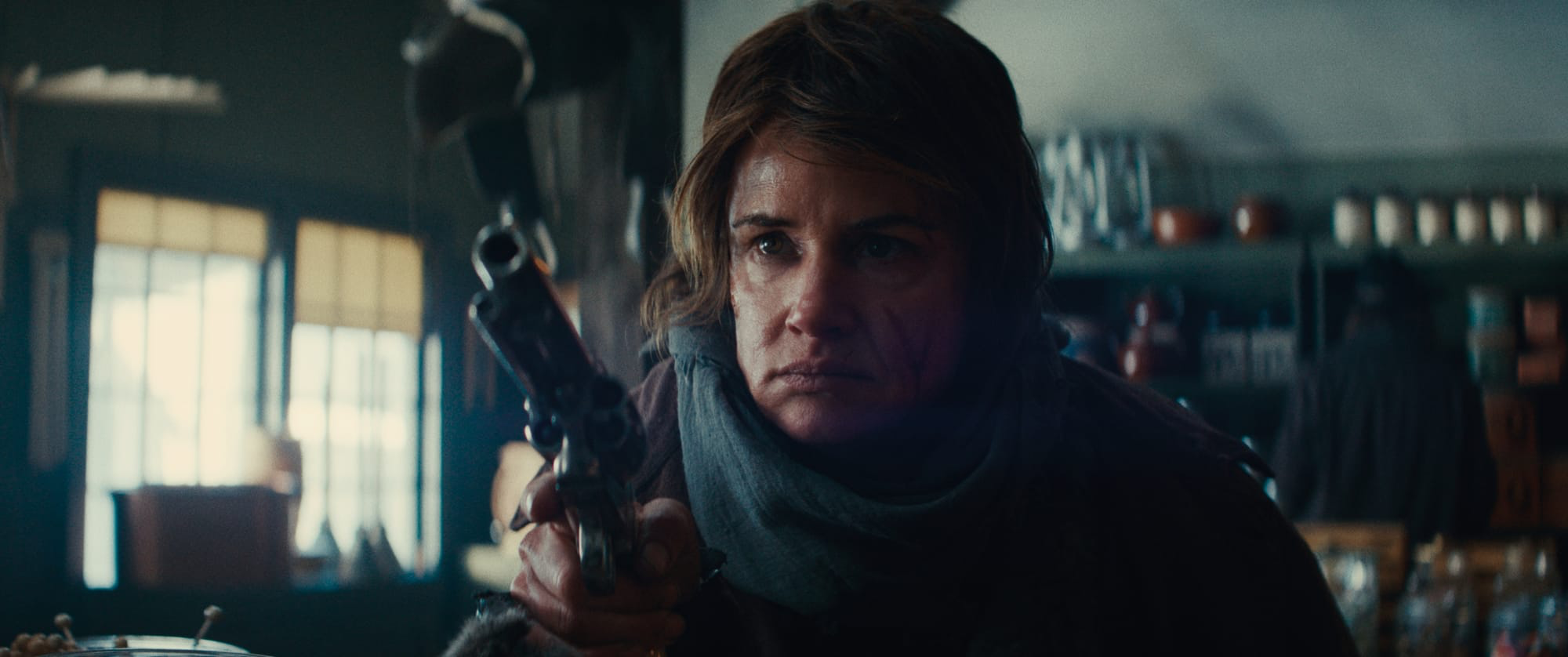
Apparently, the character is a man in the book, but here in the film, Cutthroat Bill is played by Juliette Lewis, and she revels in the role. Hardened and rough, with an ashtray voice, Cutthroat Bill is a deadly pistoleiro riding roughshod across the old West. She’s a great villain, mercurial and dangerous, and constantly chewing on black licorice. It’s a lot of fun watching her sink her teeth into this role.
Other than that, while the Thicket is never bad, it's also never really good. It’s fun. I enjoyed it. Dinklage is great, and the rest of the cast is good too (including James Hetfield, the lead singer and rhythm guitarist of the whiniest and bougiest Heavy Metal band ever). Over all, it’s well-done, but in the end, it's an overly familiar lesser shadow of much better films. Plus, seriously, why include the motorcycle?
Decent enough, but nothing special.
